Share
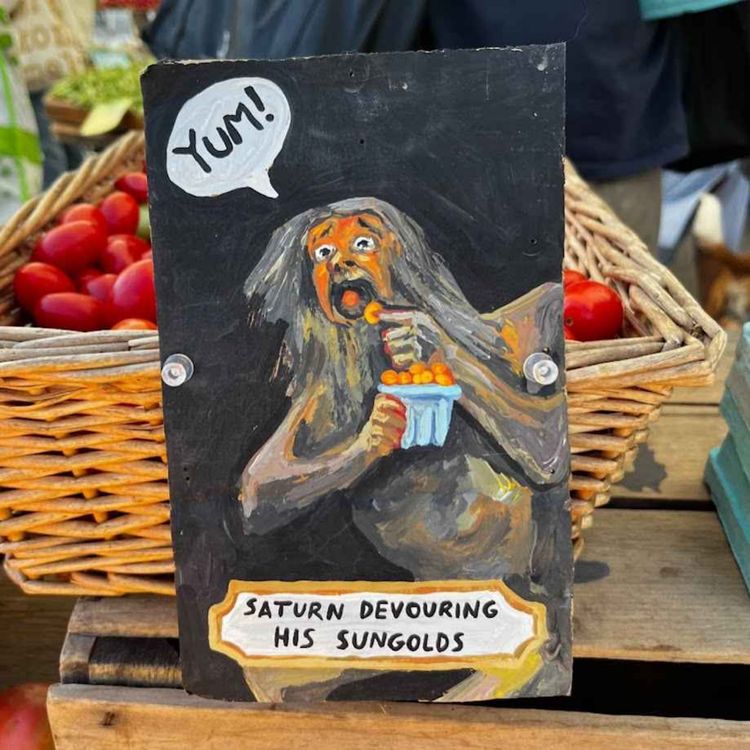
Books of All Time
Episode 15: Theogony and Works and Days, Part 1 – Ask an Ancient Greek Farmer
Season 1, Ep. 15
•
Our latest episode introduces you to the first personality in European literature: a cranky shepherd-turned-poet who wants you to know that women are a calamitous trap and that you should wear a proper hat in winter. Yes, it's Hesiod, the Ancient Greek forbear of today's op-ed columnists and reply guys. Walk with Rose through Theogony, our earliest-known source for many key Greek myths, and Works and Days, a self-help poem that's also partly a burn letter. Or maybe it's the other way around.
Need a transcript? We've got you covered. Click here to read the episode script now.
Hey, are you following us? You should! We're @booksofalltime on Bluesky, Facebook, Instagram and (ugh) X, formerly known as Twitter. Say hi!
More episodes
View all episodes
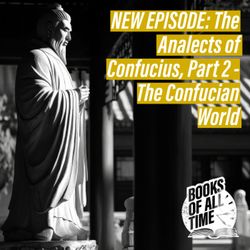
21. Episode 21: The Analects of Confucius, Part 2 - The Confucian World
38:24||Season 1, Ep. 21He died dissatisfied and relatively obscure in 479 BCE, but Confucius, thanks to his disciples, had an afterlife for the ages. Learn how Confucianism adapted, evolved and survived for more than 2,000 years in spite of mass executions of its adherents, having to compete with Buddhism and then Christianity, and having to win over an emperor who kept peeing in Confucian scholars' hats.Want to read the transcript? Urine luck! Click here to read it and see the reference list for this episode.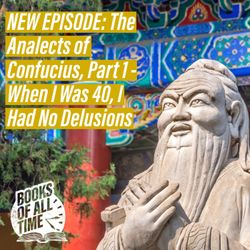
20. Episode 20: Analects of Confucius, Part 1 - When I Was 40, I Had No Delusions
38:22||Season 1, Ep. 20Episode 20 expands the map of our show to eastern Asia, as we begin a two-part exploration of The Analects (Lunyu), collected sayings of the philosopher Confucius (551 - 479 BCE). He may just be the most influential educator and philosopher who ever lived. His ideas about virtue in rulers impacting the virtue of the people . . . are honestly kind of adorable in this day and age. In this first episode, Rose takes you through some of the major themes of the Analects, with lots of passages from the Master.Want a transcript instead? Click here to read it. You can also check out the references Rose used to write the episode, and leave comments about the episode at the bottom of the transcript page. Don't forget to subscribe and rate us on your podcast app, and share us on social media. It helps!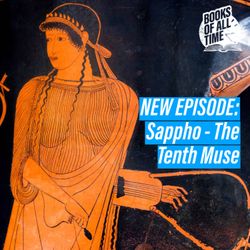
19. Episode 19: Sappho - The Tenth Muse
42:43||Season 1, Ep. 19Episode 19 is here (after Rose finally busted through her writer's block about it). This special one-off episode covers the life and remaining poetry of Sappho (c. 630-570 BCE). Known widely as a lyric poet who wrote (mostly) about same-sex love between women, Sappho, in her social context, is even more interesting. Rose walks through what's known about the woman herself, some of the most famous fragments of her poetry, and a recent controversy surrounding the discovery of "new" Sappho poetry. Scholars (allegedly) behaving badly: a favorite theme here at Books of All Time!Need a transcript? We've got you covered. Click this link to read Rose's script for the episode or visit the references section to do some research of your own.Thanks for listening! Don't forget to share this show with friends or leave us a five-star rating or review on your podcast app.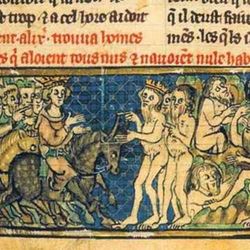
18. Episode 18: The Upanishads, Part 2 - Dionysus, Son of Indus
41:27||Season 1, Ep. 18Our second episode on the Upanishads (c. 800-300 BCE), we look at some of the striking similarities between Greek mythology and philosophy and Indian mythology and philosophy, and walk through some of the evidence that shows how societies may have been far more interconnected than we thought in ancient times.Also, Alexander the Great asks a bunch of nude yogis to dinner. Want a transcript? Read it here. Don't forget to rate and review us! It helps others find this show (and so does sharing us on your socials).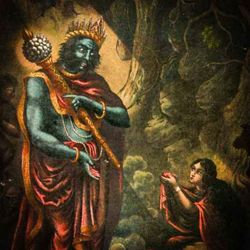
17. Episode 17: The Upanishads, Part 1 – By Wisdom and By Toil
39:58||Season 1, Ep. 17The Upanishads - commentary on commentary on the Vedas - emerged out of India sometime beginning around 500 BCE. The esoteric spiritual ideas they describe, including the oneness of all creation, the idea of karma, and the cycle of reincarnation, impacted religious thinkers from Buddha to the Beatles. This week's episode gives some of the background for this branch of Hindu scripture and summarizes four of the principal Upanishads. Plus, it's true: pundits do not achieve enlightenment. Says so right there in the book. Next time you feel tempted to drop a hot take, try chanting OM instead. Want a transcript? It's here at our website, booksofalltime.co.uk.P.S.: Are you a fellow American living abroad? Rose wants you to know that only 8% of us actually bother to send in ballots during election years. You may still be able to request yours! Go to Vote from Abroad to get started.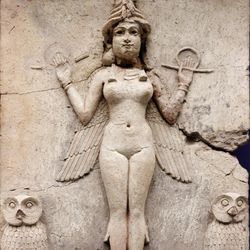
16. Episode 16: Theogony and Works and Days, Part 2 – Immortals Who Are Forever
36:02||Season 1, Ep. 16Ready for some comparative mythology? Of course you are. This episode follows up on Hesiod's Theogony and Works and Days with what is probably our most meta meta-episode yet. Host Rose Judson looks back at the five cultures we've encountered on Books of All Time to date and compares their creation myths, pantheons, and concepts about the afterlife. She also reveals the song that would be playing on an eternal loop if she were ever sent to Hell.Want to read a transcript or see our source list? Click here to visit booksofalltime.co.uk.Love our show? Leave a rating or review and share us on your socials!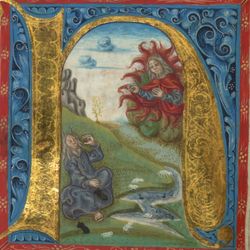
14. Episode 14: Exodus and Genesis, Part 2 – A Posterity in the Earth
36:27||Season 1, Ep. 14Our second episode on the first two books of the Bible goes a little bit deeper into the historical context in which Genesis and Exodus were written - the Wild West(ern Asia) of the post-Bronze Age Collapse. Bonus callback to our second month of episodes about The Tale of Sinuhe!As always, you can read a transcript of the episode on our website. We're also taking suggestions for the 2025-2026 reading list, which will cover roughly 500 BCE - 100 BCE. Have something from that time period you think we should read? (Bonus points if it's not Greek; there are So Many Greeks to cover next year.) Go here and pop a comment at the bottom of the page. Thanks for listening!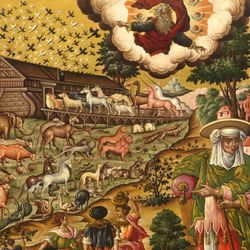
13. Episode 13: Exodus and Genesis, Part 1 – The Gold of That Land Was Good
54:55||Season 1, Ep. 13(Thanks for bearing with us while this episode was delayed—Rose was recovering from a bout of COVID!) This episode takes us into the first two books of the Bible, written c. 580 BCE during the Babylonian Captivity of the Judeans and Israelites. Stretching from the creation of the world to the liberation of the Israelites from Egypt, these two books contain some of the most memorable and influential stories that inform the faith of Jews, Christians, and Muslims around the world.Want to read the transcript? It's here at the website for our great books podcast, www.booksofalltime.co.uk. You can also find us on Bluesky, Instagram, and Facebook (we also post at Formerly Twitter, but just for the SEO). If you like what you hear, leave us a rating or review!